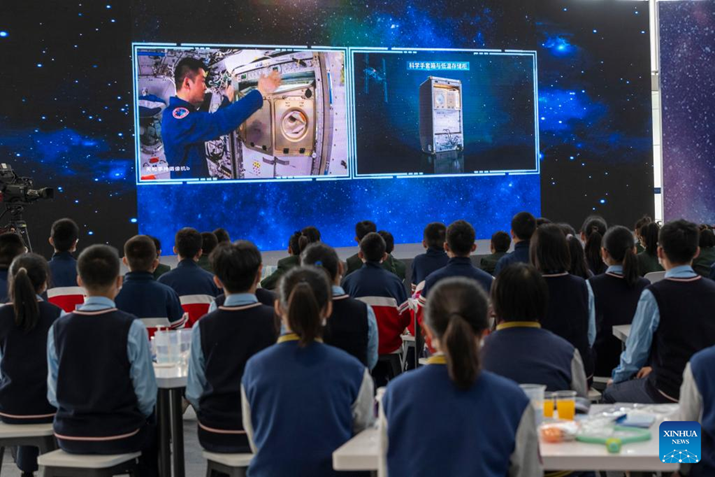| China |
| Chinese astronauts give lecture from space station | |
|
|
 Students attend the third live class of the "Tiangong Class" series at Henan Museum of Science and Technology in Zhengzhou, capital of central China's Henan Province, on October 12 (XINHUA) The third live class from China's space station was held on the afternoon of October 12, delivered by Shenzhou-14 crew members Chen Dong, Liu Yang, and Cai Xuzhe to students on Earth. The main classroom is located at the Technology and Engineering Center for Space Utilization, Chinese Academy of Sciences. The class is also being attended by students from other three classrooms in Yunnan, Henan, and Shandong. It is the first science lecture from the Wentian lab module. The previous two lectures of the "Tiangong Class" series were delivered by the Shenzhou-13 crew from the station's core module Tianhe. The lecture content includes a capillary effect experiment, the vibration of liquid and liquid-solid mixtures, drinking water with a super-long straw, rotating and flipping wrenches, and introducing a plant growth study. The astronauts first gave an introduction of the Wentian lab module. They noted that Wentian has an independent control system. It can take over the operation and control of the whole space station when the Tianhe core module has emergencies. Liu showed the students the motion and vibration of liquid in a microgravity environment. She also sipped mango juice with a two-meter straw. In another experiment, two tumbling T-handles illustrated how their motion relates to their rotation mode and mass distribution. The phenomenon, popularly known as the Dzhanibekov effect, is easier to be observed in space than on Earth. The astronauts also had an interaction with the students and answered their questions. A six-grader from Yunnan Province shared his germination test of Arabidopsis thaliana at school. Wearing mixed-reality glasses, Chen Dong showed the students the Arabidopsis thaliana at different stages of blooming in a microgravity science glove-box. Arabidopsis thalianaa is a model for understanding the molecular biology of plant traits in space. The science glove-box is a sealed working area in the space station where crew members can perform experimental procedures in cells and plants. When answering a question from a Beijing student about how to become an astronaut, Chen said that China has started selecting the fourth batch of reserve astronauts, adding that the spacecraft pilots will be recruited from the in-service pilots of the armed forces. "The space station is waiting for you," said Chen. At the end of the class, the trio expressed their expectations for the students on Earth. "The Mengtian lab module will launch into orbit soon, and we will witness the historical moment when China's space station is fully completed," Chen said. "We expect you guys to build our space home better in the future."
Students attend the third live class of the "Tiangong Class" series at the Technology and Engineering Center for Space Utilization of the Chinese Academy of Sciences in Beijing, capital of China, on October 22 (XINHUA)
|
|
||||||||||||||||||||||||||||||
|